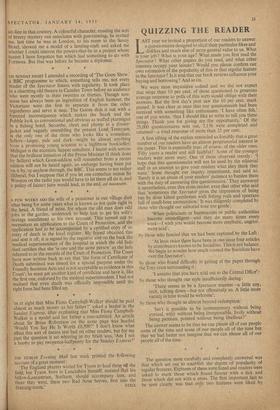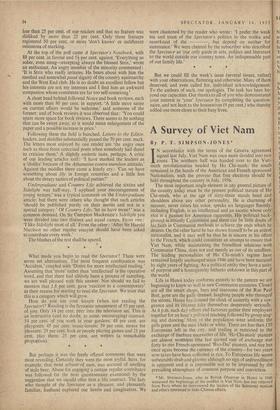QUIZZING THE READER
1..., AST year we invited a proportion of our readers to answer a questionnaire designed to elicit their particular likes and dislikes and much else of more general value to us. What is your job? What is your age? What made you first read the Spectator? What other papers do you read, and what other interests occupy your leisure? Would you please confirm our own estimation of the popularity of this or that regular feature in the Spectator? Is it true that our book reviews influence your buying and borrowing? And so on.
We were most inquisitive indeed and we did not expect that more than 10 per cent. of those questioned (a generous average response to polls of this sort) would oblige with their answers. But the first day's post saw the 10 per cent. mark passed. It was clear at once that our questionnaire had been received with something like enthusiasm. 'I have often felt.' one of you wrote. 'that 1 should like to write to tell you these things. Thank you for giving me the opportunity.' Of the 28,000 questionnaires sent out, 7,136 were completed and returned—a total response of more than 25 per cent.
A first sifting of the replies reminded us forcibly that a great number of our readers have an almost proprietorial interest in the paper. This is especially true, of course, of the older ones. 'Fifty years a reader and still faithful !' Some of the younger readers were more wary. One of them observed sternly : 'I, hope that this questionnaire will not be used by the editorial staff in an attempt to give your readers what they think they want.' Some thought our inquiry impertinent, and said so. 'Surely it is an abuse of your readers' patience to burden them with the duty of answering this questionnaire.' They answered it nevertheless, even this cross reader, even that other who said that 'sometimes the Spectator gives the impression of being run by dour kilted gentlemen with fishing rods and sporrans full of small-bore ammunition.' It was diligently completed by those who thought our editorial tone too gentle : .
'When politicians or bureaucrats or public authorities become unintelligent—and they do many times every week—I wish you would become more emphatic, angrier. more acid': by those who fancied that we had been captured by the Left: 'At least twice there have been in one issue four articles by contributors known to be Socialists. This is not balance. We begin to wonder how much control the Socialists have over the Spectator'; by those who found difficulty in getting at the paper through the Tory crust surrounding it : 'I assume that you have sold out to the Central Office': by those who thought our style insufficiently daring: 'There seems to be a Spectator manner—a little coy, arch, talking down—but not offensively so, A little more variety in tone would be welconie'; by those who thought us almost beyond redemption : 'Isn't it possible to be contemporary without being cynical, witty without being irresponsible, lively without being partisan, pointed without being libellous?'
The answer seems to be that we can please all of our people some of the time and some of our people all of the time but that we had better not imagine that we can please all of our people all of the time. , * The question most carefully and completely answered was that which set out to establish the degree of popularity of regular features. Eighteen of these were listed and readers were asked to murk those which found favour with a tick and those which did not with a cross. The first important fact to be seen clearly was that only two features were liked by What made you begin to read the Spectator? There were seven set alternatives. The most frequent combination was 'Accident,' coupled with 'Desire for more intellectual reading.' Assuming that 'more' rather than 'intellectual' is the operative word, and that there had already been a process of sampling, we are well pleased with this answer. Nor should we fail to mention that 1.8 per cent. gave 'reaction to a contemporary' as their reason for starting to read the Spectator. We trust that this is a category which will grow.
How do you use your leisure (when not reading the Spectator)? Reading is the favourite amusement of 93 per cent. of you. Only 14 per cent. peer into the television set. This is an instructive (and no doubt, to some, encouraging) contrast. 54 per cent. of you work in your gardens; 48 per cent. are playgoers; 45 per cent. music-lovers; 39 per cent. motor for pleasure; 29 per cent. look at people playing games and 21 per cent. play them; 25 per cent. are writers (a remarkable proportion).
* *
But perhaps it was the freely offered comments that were most revealing. Certainly they were the most joyful. Strix, for example, that most urbane of men, was accused of smelling of stale beer. Abuse for engaging a certain regular contributor was followed (in the next questionnaire examined) by the suggestion that we should offer him a life contract. The lady who thought of the Spectator as a pleasant. and pleasantly familiar, husband captured our hearts and imagination. We less than 25 per cent. of our readers and that no feature was disliked by more than 25 per cent. Only three features registered 50 per cent. or more 'don't knows' or indifferent omissions of marking.
At the top of the poll came A Spectator's Notebook, with 88 per cent. in favour and 5i-per cent. against. 'Everything so sober, even smug—excepting always the blessed Strix,' wrote an enthusiast. An angry member of the minority commented : 'It is Strix who really irritates. He bears about with him the • rarefied and somewhat passé dignity of the country squirearchy and the West End club. He is no doubt an excellent fellow but his• interests are not my interests and I find him an awkward companion whose comments are far too self-conscioua.'
A short head behind followed Notes and book reviews, each with more than 80 per cent. in support. 'A little more satire on current affairs would be welcome,' said someone of the former; and of book reviews it was observed that : 'You could spare more space for book reviews. There seems to be nothing that can be swept away, so it would mean enlargement of the paper and a possible increase in price.' , Following these the field is bunched. Letters to the Editor, leaders, and middles substantially passed the 70 per cent, mark.
The letters most enjoyed by one reader are 'the angry ones such as those from conceited poets when somebody had dared to criticise them.' A slightly esoteric taste, perhaps. A critic of our leading articles said : 'I have marked the leaders as a 'dislike' because of the A thanasius contra mundum attitude‘' Against the middles there came a lonely cry : 'Can we have something about life in foreign countries and a little less about the dreary tactics of political parties?'
Undergraduate and Coumry Life achieved the sixties and Sidelight was half-way. 'I applaud your encouragement of young writers,' was a typical comment on the Undergraduate article; but there were others who thought that such articles 'should be published purely on their merits and not in a special category.' Of Country Life, let us have morel' was a common demand. On Sir Compton Mackenzie's Sidelight you were divided into two distinct and equal camps. From one : 'I like Sidelight most of all.' From the other : 'After Sir Harold Nicolson no other regular essayist should have been asked to contribute every week.'
The blushes of the rest shall be spared.
4
* *
were chastened by the reader who wrote : 'I prefer the weak tea and toast of the Spectator's politics to the vodka and sauerkraut of the , but depend on neither for sustenance.' We were cheered by the subscriber who described the Spectator as 'our only guide in arts, politics and literature to the, world outside our country town. An indispensable part of our family life.'
* * *
But we could fill the week's issue (several issues, rather) with your observations, flattering and otherwise. Many of them deserved, and even called for, individual acknowledgement. To the authors of such, our apologies. The task has been be- yond our capacities. Our thanks to all of you who demonstrated your interest in 'your' Spectator by completing the question- naire, and not least to the housewives (9 per cent.) who thereby added one more chore to their busy lives.



































 Previous page
Previous page